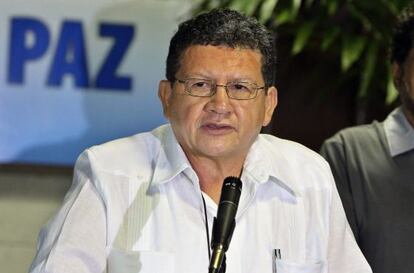FARC admits to causing “victims and pain” as Colombia peace talks resume
Guerrilla force talks for first time of civilian casualties and need for reparations

Nine months of talks between the Colombian government and the FARC guerrillas had to elapse before the latter admitted to their share of responsibility in the thousands of victims of a war that is already half a century old.
After refusing to do so time and again, on Monday the FARC delegation, standing at the entrance of the Havana Convention Center, which is hosting the peace talks, publicly admitted that its men have caused “victims and pain,” and opened up the possibility of “reparations with complete loyalty to the cause of peace and reconciliation.”
Reparation for the victims has become one of the thorniest elements of the peace process, precisely because of the FARC’s refusal to admit to their existence. In the preliminary negotiation guidelines signed between both parties, the issue of the victims was summed up in one high-sounding sentence: “Compensation for the victims will be at the core of the accords.”
Yet several guerrilla negotiators currently in Cuba have said on several occasions that there is no need for them to feel accountable to any victim, because they are “popular fighters” who never committed “crimes against the people.”
There has been harshness and pain caused from our ranks, but the enemy did not abide by combat rules"
This had been the prevailing attitude ever since negotiations began in 2012 in Oslo, Norway. Iván Márquez, the chief negotiator and FARC’s number two man, has often insisted that they are not the cause of the violence, but merely the answer to state violence, and that in order to broach the subject of the victims at all it is first necessary to “address state terrorism.”
But now their stance seems to have softened up. Monday’s statement was made by a FARC negotiator who also heads the group’s Western Bloc, Jorge Torres Victoria, also known as “Pablo Catatumbo.” It is necessary to compensate the victims of violence “with the desire of highlighting the need for collective forgiveness,” said Catatumbo before walking into a new session of the 13th round of talks with the Colombian government. The guerrilla chief admitted that in Colombia’s armed conflict “there has been harshness and pain caused from our ranks,” but noted that the state has been a party to that cruelty. “The enemy was never easy; it did not abide by combat rules.”
In late July, President Juan Manuel Santos admitted the state’s share of responsibility in human rights violations and infringement of international humanitarian law before the Constitutional Court. “In some cases it was through omission, in others through direct action by some state agents,” said the Colombian leader before an audience filled with journalists, to whom he was explaining the details of the controversial Juridical Framework for Peace, a series of constitutional reforms to create transitory justice tools for a post-conflict situation. “It was perfectly clear to the government that the starting point for any solution to the conflict would be recognition and compensation of victims,” explained Santos.
In Monday’s statement, FARC spokesmen also proposed creating a committee of national and international experts to study the origin of the armed conflict and its consequences. This proposal comes less than a month after an extensive and dramatic report by the National Center for Historical Memory found that the conflict has caused around 220,000 deaths since 1958, and that a majority of the victims, 176,000, were civilians. According to this research group, for every fallen combatant there were four civilian casualties, and three out of every 10 Colombians who died in the last 54 years lost their lives because of the war.
It was precisely at the request of the National Center for Historical Memory that President Santos admitted to the state’s responsibility in a conflict whose figures reveal a bitter war with an estimated 25,000 missing people, 6,000 child soldiers, 10,000 amputees from antipersonnel mines and nearly five million displaced persons.
Tu suscripción se está usando en otro dispositivo
¿Quieres añadir otro usuario a tu suscripción?
Si continúas leyendo en este dispositivo, no se podrá leer en el otro.
FlechaTu suscripción se está usando en otro dispositivo y solo puedes acceder a EL PAÍS desde un dispositivo a la vez.
Si quieres compartir tu cuenta, cambia tu suscripción a la modalidad Premium, así podrás añadir otro usuario. Cada uno accederá con su propia cuenta de email, lo que os permitirá personalizar vuestra experiencia en EL PAÍS.
En el caso de no saber quién está usando tu cuenta, te recomendamos cambiar tu contraseña aquí.
Si decides continuar compartiendo tu cuenta, este mensaje se mostrará en tu dispositivo y en el de la otra persona que está usando tu cuenta de forma indefinida, afectando a tu experiencia de lectura. Puedes consultar aquí los términos y condiciones de la suscripción digital.








































